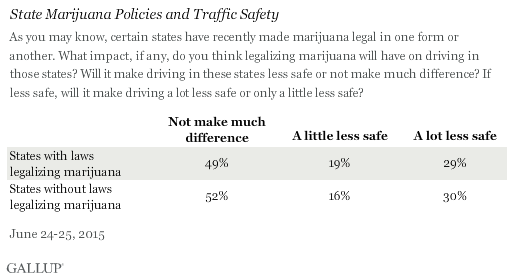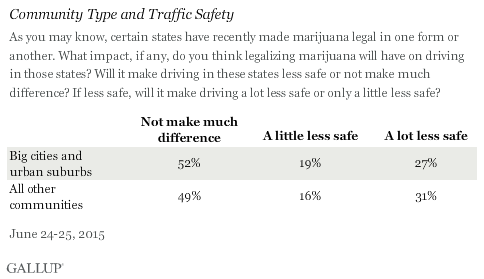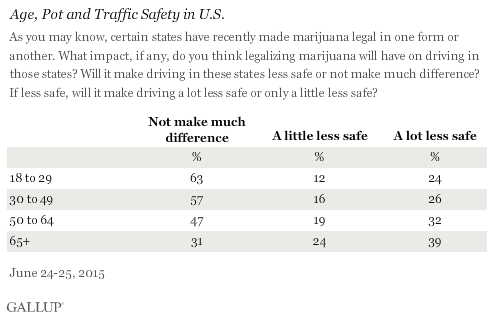Story Highlights
- 30% of Americans say driving will be "a lot less safe"
- Not much difference between states by legal status of marijuana
- Older Americans most concerned about marijuana and auto safety
WASHINGTON, D.C. -- As some U.S. states have legalized marijuana for recreational and medicinal use, 30% of Americans say legalization will make driving in those states a lot less safe. Another 17% expect it to make driving a little less safe. Half of Americans, however, say it will not make much of a difference.

Those in states with some form of legal marijuana are no different in their assessments of its effect on automotive safety than those in states without laws legalizing the drug. Across the 23 states and the District of Columbia that have some form of legalization, 49% say marijuana legalization will not make much difference in driving safety. This is on par with the 52% in the other 27 states who say legalizing pot would not make much of a difference for road safety. Similarly, 29% in states with some form of marijuana legalization say the roads will be a lot less safe, roughly matching the 30% saying the same in states with no legalized marijuana.

Marijuana is by far the most-used illicit drug. The Substance Abuse and Mental Health Services Administration (SAMHSA) reported in 2013 that nearly 20 million people had used marijuana in the past month. A 2013 Gallup poll found that 38% of Americans have tried marijuana and 7% admitted they were current marijuana smokers. Legalized pot across the U.S. ranges from recreational to medical purposes, and marijuana use on the whole has increased since 2007. While in many states, medical marijuana has been legal for more than a decade, the legalization of recreational marijuana has started only in the past few years -- with four states and Washington, D.C., having laws in place that permit pot use and actually regulating it for tax revenues. Studies have shown that marijuana use affects reaction times, judgment and awareness, but there is no consensus on whether driving while high will adversely affect road safety.
The ultimate impact of marijuana use on traffic safety will be determined both by its effect on one's ability to drive and by how common it becomes for people to drive under its influence. Americans today perceive alcohol as a greater threat to traffic safety than marijuana, which may largely reflect the more widespread use of alcohol than marijuana among Americans and the highly publicized adverse effects of alcohol on driving ability.
Urban Residents' Views Similar to Those of Nonurban Residents
Illicit drug use is higher in metropolitan areas than in rural areas, according to SAMHSA. Yet Gallup finds that Americans living in big cities and urban suburbs are no more likely than those living in all other communities to say marijuana affects driving safety in states where it is legal.

For this analysis, "big city" residents are those living in the 47 U.S. counties that include the nation's largest cities, and "urban suburb" residents are those living in 107 counties that hold the "near-in suburbs" of most major cities and can have characteristics similar to those of big cities. These community segments come from the American Communities Project.
Older Americans See Marijuana as Affecting Auto Safety
While respondents' community type and state policies do not relate to differing opinions on marijuana's impact on driving safety, age does. Specifically, 18- to 29-year-olds (63%) are twice as likely as those aged 65 and older (31%) to see marijuana legalization as not having much effect on traffic safety in states where it is legal. For those aged 50 and older, more than half believe legalization would have some effect on driver safety, while more than half of those younger than 50 say it will make little difference.

Bottom Line
If the trend toward states legalizing marijuana continues, it may affect millions more Americans directly or indirectly in the coming years. Gallup's new study on public views about the effect of legalization on driving will serve as a baseline to measure how these perceptions may change over time.
While the effect of pot use on driving may not be as severe as the effect of alcohol, the National Highway Traffic Safety Administration has stated there are increased risks associated with driving while high. States' efforts to strengthen regulations and enforcement related to driving after smoking marijuana will likely be guided by how frequently accidents can be traced to pot use. And this, in turn, will likely influence public opinion as well.
While the effect marijuana use has on traffic safety is yet to be determined, for now, these data may defuse arguments that increased legalization across the U.S. will influence driver safety. With just 30% of Americans currently saying that an increase in legal marijuana would make driving a lot less safe, and 50% saying it will not make much difference, the pro-legalization forces may have an advantage.
Survey Methods
Results for this Gallup poll are based on telephone interviews conducted June 24-25, 2015, on the Gallup U.S. Daily survey, with a random sample of 1,007 adults, aged 18 and older, living in all 50 U.S. states and the District of Columbia. For results based on the total sample of national adults, the margin of sampling error is ±4 percentage points at the 95% confidence level.
Each sample of national adults includes a minimum quota of 50% cellphone respondents and 50% landline respondents, with additional minimum quotas by time zone within region. Landline and cellular telephone numbers are selected using random-digit-dial methods.
Learn more about how Gallup Daily tracking works.

